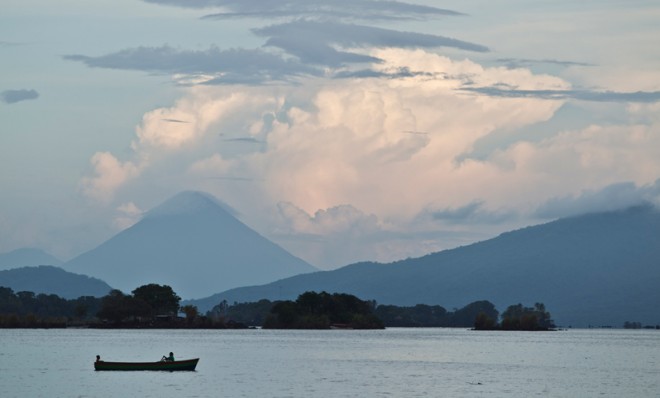Nicaragua's logic-defying bid to rival the Panama Canal
The world has one shortcut joining the Atlantic and Pacific. Does it need another?


A free daily email with the biggest news stories of the day – and the best features from TheWeek.com
You are now subscribed
Your newsletter sign-up was successful
Nicaraguan lawmakers have given their backing to a Hong Kong company's proposal to build a canal across their Central American nation, connecting the Atlantic and Pacific Oceans. Supporters in the National Assembly, which is controlled by President Daniel Ortega's Sandinista Front, hope the jobs and economic growth spurred by the project — along with the government's share of the profits — will lift the nation out of poverty, much the way the Panama Canal has proved a valuable source of revenue for Panama. But not everyone thinks the project is so sensible. Here, a brief guide:
What is the company proposing to do?
The Chinese consortium behind the plan wants to build a canal stretching as long as 178 miles, depending on which of four possible paths the group selects. The consortium also hopes to build two deep-water ports and two free-trade zones. The $40 billion project would include an oil pipeline, a rail line, and an airport. The builders would pay Nicaragua's government $10 million a year. After 10 years, Nicaragua would own 10 percent of the canal, a stake that would grow over a century until the canal belonged completely to the government.
The Week
Escape your echo chamber. Get the facts behind the news, plus analysis from multiple perspectives.

Sign up for The Week's Free Newsletters
From our morning news briefing to a weekly Good News Newsletter, get the best of The Week delivered directly to your inbox.
From our morning news briefing to a weekly Good News Newsletter, get the best of The Week delivered directly to your inbox.
Who is behind the plan?
The company, HK Nicaragua Canal Development Investment Co., is run by Wang Jing, a Chinese telecom tycoon. He has no background in the type of engineering megaproject he wants to pull off in Nicaragua — a country he has visited just once, in September. The developers reportedly hope to get outside investors to help pay for the project, which has a price tag four times greater than Nicaragua's GDP.
Is it a new idea?
Building a canal across Nicaragua is a dream that has eluded Nicaragua's business elite — and Americans from the Vanderbilts to Teddy Roosevelt — for more than 150 years. The country almost got a transoceanic canal once before. "In 1902," explains Jose de Cordoba at The Wall Street Journal, "Nicaragua missed out when the proponent for the rival Panama project sent U.S. senators a stamp showing Nicaragua's Momotombo volcano spouting smoke. Spooked senators cast their vote for Panama."
A free daily email with the biggest news stories of the day – and the best features from TheWeek.com
What do Nicaraguans say?
Many Nicaraguans are happy leaving the canal business to Panama, largely because the project could be an environmental disaster. Although no route has been made public, the consensus is that the canal will make use of Lake Nicaragua, to cut down dramatically on the amount of digging. Environmentalists fear that will mean draining the lake, a major source of fresh water, to fill the canal's locks.
Does the region need another canal?
Probably not. Experts say a Nicaraguan canal would not be able to compete with the Panama Canal, which is being expanded in a $5 billion project that will allow it to accommodate larger ships than ever before. Not only that, but the Panama Canal — just 50 miles long — is much shorter. Also, highways and freight rail lines crisscrossing the U.S. can handle a big hunk of the market the company behind the Nicaragua canal is going after.
So why build it?
Supporters say it's a way to capitalize on one of the country's great untapped resources — its location on a narrow land bridge joining the Atlantic and Pacific Oceans. "That's why this idea has always been around," Sandinista congressman Jacinto Suarez says. "Global trade demands that this canal is built because it's necessary. The data shows that maritime transport is constantly growing and that makes this feasible. Opposing it is unpatriotic."
When will it be open for business?
That's anybody's guess. Skeptics say it will never be built. Nicaragua's National Assembly has merely voted to grant the Hong Kong company a 50-year concession, with an option to renew for another 50 years. Experts say investors won't come forward to pay for the doomed project. "I can't see how this canal could be financially or economically justified," Jean-Paul Rodrigue, a transportation expert at Hofstra University, tells the Journal. "It could be the biggest white elephant in human history."
Sources: Associated Press, TIME, Wall Street Journal
Harold Maass is a contributing editor at The Week. He has been writing for The Week since the 2001 debut of the U.S. print edition and served as editor of TheWeek.com when it launched in 2008. Harold started his career as a newspaper reporter in South Florida and Haiti. He has previously worked for a variety of news outlets, including The Miami Herald, ABC News and Fox News, and for several years wrote a daily roundup of financial news for The Week and Yahoo Finance.
-
 Switzerland could vote to cap its population
Switzerland could vote to cap its populationUnder the Radar Swiss People’s Party proposes referendum on radical anti-immigration measure to limit residents to 10 million
-
 Political cartoons for February 15
Political cartoons for February 15Cartoons Sunday's political cartoons include political ventriloquism, Europe in the middle, and more
-
 The broken water companies failing England and Wales
The broken water companies failing England and WalesExplainer With rising bills, deteriorating river health and a lack of investment, regulators face an uphill battle to stabilise the industry
